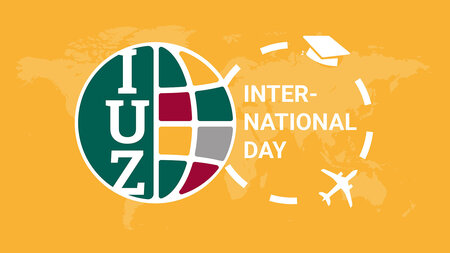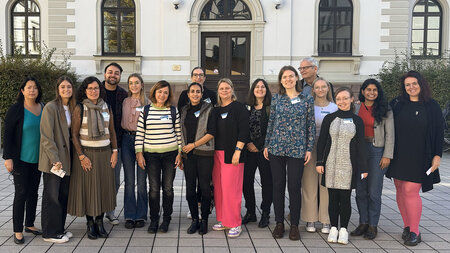Progress as a Guarantee of Success and Acceptance
Eleven questions addressed to Prof. Dr. Ralph Mayer, who is a holder of the Professorship for Automotive System Design since October 2014
-

Prof. Dr. Ralph Mayer brings his experience from the chassis development at TU Chemnitz. And as a tourist attraction in the region, he recommends the Saxon Commercial Vehicle Museum in Hartmannsdorf. Photo: Sven Gleisberg
Prof. Dr. Ralph Mayer (40) holds the Professorship for Automotive System Design at the Faculty of Mechanical Engineering since October 2014. In eleven answers he gives the readers of “University News“ an insight into his career, goals and time in Chemnitz.
What do we actually understand by the term “political science research methods”?
The exact answer can probably give only an appointments committee. But seriously: All types of vehicles can be divided into functional systems and other subsystems. This modularity characterizes not only the range of different vehicle manufacturers, but at the same time provides the basis for the structured product engineering process in the development, and a prerequisite for an expansion in a wide range of vehicle models ("platform strategy"). That these thoughts can then be transferred also into the area of research and teaching, to my mind is logical, even if the denomination of the professorship fails to appear self-explanatory.
TU Chemnitz is for me as a junior professor the right choice, because…
…I was already as a student here in the right university, could unfold myself freely and received an excellent education. I hope that this spirit has managed not only maintain, but also to further develop itself.
Could you say a few words about your academic career?
After the course of study with focus in Structure and Propulsion Technology and Machine Tools until 2001, I have been working as a scientific assistant at the Professorship of Automotive Engineering at TU München until 2007. Then I worked until 2014 in the chassis development of Daimler AG at Sindelfingen and now I am appointed as a Professor of Vehicle System Design.
Describe your study time in no more than 15 words.
Besides professional training, I had an opportunity to be socially engaged and gain experience (Senate, University Sports, VDI, …).
Did you have role models during your studies who encouraged you to pursue a scientific career?
There were fewer individual models that have shaped my career. Certainly there has been an influence of the colleagues from research and industry. Their opinion was important to me and has shown the paths and options that I have then partly chosen. At least I did not leave any chance, which sometimes opened unexpectedly, to slip away being not used. I believe that so far, I have succeeded quite well.
What advice would you give to young students and graduates?
Among other things, an awareness of a critical and self-critical approach. I have often experienced in the industrial environment that one has been satisfied with management of the status quo. In this way, one does not generate progress, and is the ultimate guarantor of the success and acceptance of things we develop in engineering and in vehicle technology and the successful marketing in the world.
What would you like to achieve in the teaching for the future?
I see it clearly: technical qualifications of students that make them, graduates in the automotive industry and supplier industry to highly esteemed employees. Due to the existing curriculum with regard to the production technology, materials science and also the lightweight activities I find it as a very appealing base.
Which impact do you make in the research at TU Chemnitz?
Touchdown is, of course, my previous experience from the chassis development, but also the knowledge I could acquire as a research assistant. In the industry I was able to significantly contribute to the establishment of lightweight components for mass that has taken hold as the most favorable light construction work throughout the vehicle. In this context were included close cooperation and exchange of experience with process development and production technology. I strive for cooperation and knowledge transfer, particularly in terms of lightweight construction, materials and manufacturing technology to achieve an advance in the functionality of vehicle-specific application; if this idea can wide substantiate – we have achieved a lot. In addition, there is to be a further focus on the aspect of chassis technology and driving dynamics.
There are around 45.000 professors at German universities. What sets you apart from others?
In my opinion, it is less individual withdrawal. Despite, every now and then, leveling by the European education policy, in recent years, constitutionally guarantees Germany, as the university location which is marked by its history, freedom in teaching and research. This gives us all the room for customization and I’m looking forward to shape it myself again.
Which place do you show your guests the most in Chemnitz?
The places of industry history fascinate me. Coming from Ingolstadt, one has a quick reference thereto, thanks to Auto Union and Schubert & Salzer. When I see Chemnitz not only as a city, but as a region, then the museum of utility vehicles in Hartmannsdorf is an integral part of it.
How do you play a part in the life of the city?
I must confess: in order to be able to come up with something concrete, my presence here is still too short. Although friends and acquaintances in previous business and private environment have been following my career change with a great interest and would like to visit me. Thus, I can even be active in the external impact towards Bavaria and Baden-Württemberg.
(Translation: Nataliia Boiko)
Katharina Thehos
17.11.2014





